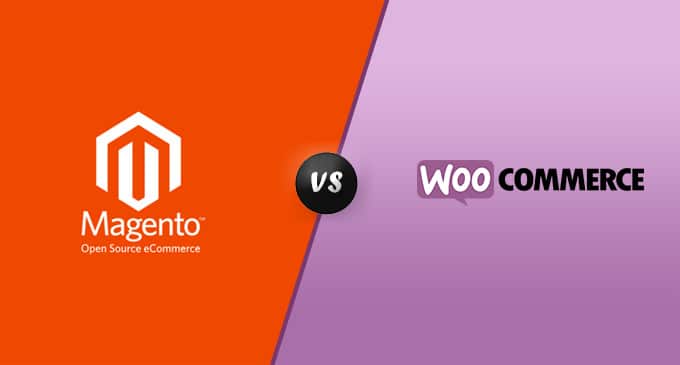Choosing the right eCommerce platform is a crucial decision that can impact the success of your online store. Two of the most popular choices are Magento and WooCommerce, both of which offer powerful features. But which one is right for your business? Let’s dive into a detailed comparison of these platforms to help you make the best choice.
Overview of Magento and WooCommerce
Magento:
Magento is a highly flexible, open-source eCommerce platform built for larger businesses that need advanced features and the ability to scale. It offers extensive customization options, allowing developers to create tailored solutions for complex business needs. Magento is known for its robustness, making it ideal for large-scale online stores with high traffic volumes.
WooCommerce:
WooCommerce, on the other hand, is a plugin for WordPress, designed for small to medium-sized businesses. It is user-friendly and easy to integrate with an existing WordPress site, offering a range of features that are perfect for businesses just starting or those looking to expand into eCommerce. WooCommerce is more suited for users who prioritize ease of use and affordability.
Performance and Scalability
Magento:
When it comes to performance, Magento is built for handling high-traffic, large-scale operations. It is optimized for speed and can process thousands of transactions simultaneously, making it a great fit for large e-commerce stores. Magento also offers advanced caching features and scalable cloud solutions to ensure optimal performance as your business grows.
If your store is expected to scale rapidly or you anticipate a lot of traffic, Magento can handle the load. However, you may need more powerful servers and a dedicated development team to manage it effectively.
WooCommerce:
WooCommerce is well-suited for small to medium-sized businesses with moderate traffic. While it can handle scalability with the right hosting solution, it is not as performance-focused as Magento. WooCommerce depends heavily on your WordPress setup and the hosting environment, meaning that its performance can be affected by factors such as server quality and plugin choices.
For businesses with smaller inventories and less traffic, WooCommerce offers a more budget-friendly and easier-to-manage option.
Cost Comparison
Magento:
Magento can be costly to set up and maintain, particularly for businesses using Magento Commerce, the enterprise version. Costs may include hosting, development, maintenance, and security, with additional expenses for extensions and premium features. Although the open-source version of Magento is free, the additional costs of running a large-scale online store can add up quickly.
For large businesses with complex requirements, the cost may be justified due to Magento’s power and scalability. But for smaller businesses, the costs may be prohibitive.
WooCommerce:
WooCommerce is a more affordable solution, particularly for small to medium-sized businesses. The WooCommerce plugin itself is free, but additional costs may include premium themes, hosting, and paid plugins. However, even with these extras, WooCommerce tends to be more budget-friendly than Magento.
For businesses with tighter budgets, WooCommerce provides a cost-effective solution without sacrificing essential eCommerce features.
Ease of Use and Learning Curve
Magento:
Magento is known for its complexity. While it offers extensive customization options, it requires technical expertise to set up and manage. Businesses often need to hire developers to build and maintain their Magento stores, which can increase costs and time spent on development.
If you’re looking for a platform that allows for heavy customization but doesn’t mind a steeper learning curve, Magento may be the right choice.
WooCommerce:
WooCommerce is far easier to use, especially for those familiar with WordPress. It is beginner-friendly and doesn’t require much technical knowledge to get started. Most small business owners can set up a WooCommerce store on their own, especially with the abundance of tutorials and resources available.
For small to medium-sized businesses that prioritize ease of use, WooCommerce is a great option that requires minimal technical expertise.
Security Features
Magento:
Magento offers a range of advanced security features, including SSL certificates, two-factor authentication, and custom security patches. Its enterprise-level security measures make it a great choice for larger businesses that need top-tier protection.
WooCommerce:
WooCommerce also provides robust security features, but much of it depends on your hosting provider and how well you manage your WordPress site. SSL certificates, security plugins, and regular updates are essential to keeping your WooCommerce store secure.
Customization and Flexibility
Magento:
Magento excels in customization and flexibility. It offers thousands of extensions and allows developers to tailor the platform to meet the specific needs of any business. This makes Magento ideal for large stores with unique or complex requirements.
WooCommerce:
WooCommerce is also highly customizable, with a large library of plugins and themes. However, it’s more limited in comparison to Magento when it comes to large-scale customization. For small to medium businesses, WooCommerce offers sufficient flexibility to create a unique online store without the need for heavy development.
SEO Capabilities
Magento:
Magento offers powerful SEO tools, allowing businesses to optimize their online store for search engines. From metadata to URL structure and site speed, Magento’s advanced SEO features give it an edge for businesses that rely heavily on organic search traffic.
WooCommerce:
WooCommerce also has solid SEO capabilities, thanks to its integration with WordPress, which is well-known for being SEO-friendly. With the help of SEO plugins like Yoast, WooCommerce can perform well in search rankings.
Conclusion: Which eCommerce Platform Should You Choose?
Choose Magento if you run a large business with high traffic, complex needs, and the resources to manage a custom solution. Magento is ideal for companies looking for advanced features, scalability, and enterprise-level security.
Choose WooCommerce if you’re a small to medium-sized business with a limited budget and want an easy-to-use platform that can integrate seamlessly with WordPress. WooCommerce is perfect for businesses looking for affordability and simplicity without sacrificing essential eCommerce features. Ultimately, the best choice between Magento and WooCommerce depends on the size, complexity, and goals of your online store. Both platforms have their strengths, and understanding your business needs will help you make the right decision.
